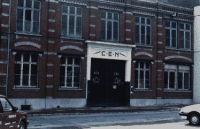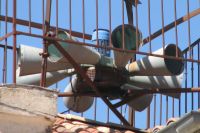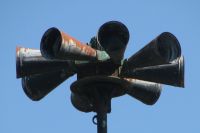Constructions Électriques du Nord: Difference between revisions
No edit summary |
No edit summary |
||
| Line 6: | Line 6: | ||
== History == | == History == | ||
Constructions Électriques du Nord was founded at the turn of the 19th century in 1897, with 1 source suggesting they were founded even earlier in 1885. CEN started as little more than a small electrical machine shop, producing small motors which would power formerly steam-driven wool mills. The company's operations grew in size and scope during the 1900s, and the outbreak of World War I likely saw an increase in CEN's manufacturing capabilities. Contrary to what some believe, CEN did not produce air raid sirens during World War I, with the only known manufacturers of sirens at the time being [[CICCA]] and [[Chollet]], of which very little are known about. CEN's sirens came at a much later date in 1926, when the company began to produce 2 models of outdoor warning sirens under François Odoux's direction, the CEO of the company at the time. CEN produced sirens from then until its closure, with units hailing from the late 1980s to support this claim. Production of CEN's sirens during the 1940s likely continued to increase during World War II, with high demand for sirens to warn the public about Axis air raids. | Constructions Électriques du Nord was founded at the turn of the 19th century in 1897, with 1 source suggesting they were founded even earlier in 1885<ref>http://pgosse.chez.com/CEN.htm</ref>. CEN started as little more than a small electrical machine shop, producing small motors which would power formerly steam-driven wool mills. The company's operations grew in size and scope during the 1900s, and the outbreak of World War I likely saw an increase in CEN's manufacturing capabilities. Contrary to what some believe, CEN did not produce air raid sirens during World War I, with the only known manufacturers of sirens at the time being [[CICCA]] and [[Chollet]], of which very little are known about. CEN's sirens came at a much later date in 1926, when the company began to produce 2 models of outdoor warning sirens under François Odoux's direction, the CEO of the company at the time. CEN produced sirens from then until its closure, with units hailing from the late 1980s to support this claim. Production of CEN's sirens during the 1940s likely continued to increase during World War II, with high demand for sirens to warn the public about Axis air raids. | ||
After the war, Odoux saw an opportunity to improve the primitive state of individual controls for small machines, with many at the time still controlled by pulley devices and belt transmissions. He founded FOX Motors in 1949, which complemented CEN's manufacturing and focused on fractional horsepower motors. FOX Motors began to produce sirens of their own in 1964, named the MONICA and PAKITA. The latter became predominant in the market, and competed with CEN's own NP2S and NP3S, despite Odoux's intention with FOX Motors to not compete with CEN at all. CEN began to produce brand new brushless AC motors begun in the early 1970s, as well as waterproof motors specifically built for UNITEC's water pumps, who later licensed their design to the American firm WEMCO. Unfortunately, CEN had closed up shop by 1989; it is believed that KM Europ acquired the company, explaining the similar designs shared between the 2. Though little is known about CEN, they were one of the most influential siren manufacturers shortly before, during, and after World War II. Despite the company being long gone, CEN sirens are one of, if not the most common sirens in France's nationwide siren system. Today, [[Moteurs FOX|FOX Motors]] continues CEN's legacy with their still manufactured PAKITA series of sirens, derived from CEN's models. | After the war, Odoux saw an opportunity to improve the primitive state of individual controls for small machines, with many at the time still controlled by pulley devices and belt transmissions. He founded FOX Motors in 1949, which complemented CEN's manufacturing and focused on fractional horsepower motors. FOX Motors began to produce sirens of their own in 1964, named the MONICA and PAKITA. The latter became predominant in the market, and competed with CEN's own NP2S and NP3S, despite Odoux's intention with FOX Motors to not compete with CEN at all. CEN began to produce brand new brushless AC motors begun in the early 1970s, as well as waterproof motors specifically built for UNITEC's water pumps, who later licensed their design to the American firm WEMCO. Unfortunately, CEN had closed up shop by 1989; it is believed that KM Europ acquired the company, explaining the similar designs shared between the 2. Though little is known about CEN, they were one of the most influential siren manufacturers shortly before, during, and after World War II. Despite the company being long gone, CEN sirens are one of, if not the most common sirens in France's nationwide siren system. Today, [[Moteurs FOX|FOX Motors]] continues CEN's legacy with their still manufactured PAKITA series of sirens, derived from CEN's models. | ||
| Line 20: | Line 20: | ||
work in progress | work in progress | ||
== References == | |||
[[Category:Omnidirectional Sirens]] | [[Category:Omnidirectional Sirens]] | ||
Revision as of 22:49, 12 September 2024
Northern Electrical Constructions
Constructions Électriques du Nord
| |
 1 of CEN's buildings in 1989. Photo courtesy of Philip Gosse. | |
| Headquarters | Tourcoing, HDF |
|---|---|
| Key people | François Odoux-Lefebvre
|
| Founded | 1885
1897
|
| Products | Outdoor warning sirens
Electric motors
|
| Succeeded by | FOX Motors |
Northern Electrical Constructions (French: Constructions Électriques du Nord; abbreviated CEN), was a manufacturer of electrical machinery such as motors, generators, and outdoor warning sirens founded in 1897. CEN was one of the earliest manufacturers of sirens in France, producing them at least since 1926, and even after the company's closure, their sirens are a common sight in France.
History
Constructions Électriques du Nord was founded at the turn of the 19th century in 1897, with 1 source suggesting they were founded even earlier in 1885[1]. CEN started as little more than a small electrical machine shop, producing small motors which would power formerly steam-driven wool mills. The company's operations grew in size and scope during the 1900s, and the outbreak of World War I likely saw an increase in CEN's manufacturing capabilities. Contrary to what some believe, CEN did not produce air raid sirens during World War I, with the only known manufacturers of sirens at the time being CICCA and Chollet, of which very little are known about. CEN's sirens came at a much later date in 1926, when the company began to produce 2 models of outdoor warning sirens under François Odoux's direction, the CEO of the company at the time. CEN produced sirens from then until its closure, with units hailing from the late 1980s to support this claim. Production of CEN's sirens during the 1940s likely continued to increase during World War II, with high demand for sirens to warn the public about Axis air raids.
After the war, Odoux saw an opportunity to improve the primitive state of individual controls for small machines, with many at the time still controlled by pulley devices and belt transmissions. He founded FOX Motors in 1949, which complemented CEN's manufacturing and focused on fractional horsepower motors. FOX Motors began to produce sirens of their own in 1964, named the MONICA and PAKITA. The latter became predominant in the market, and competed with CEN's own NP2S and NP3S, despite Odoux's intention with FOX Motors to not compete with CEN at all. CEN began to produce brand new brushless AC motors begun in the early 1970s, as well as waterproof motors specifically built for UNITEC's water pumps, who later licensed their design to the American firm WEMCO. Unfortunately, CEN had closed up shop by 1989; it is believed that KM Europ acquired the company, explaining the similar designs shared between the 2. Though little is known about CEN, they were one of the most influential siren manufacturers shortly before, during, and after World War II. Despite the company being long gone, CEN sirens are one of, if not the most common sirens in France's nationwide siren system. Today, FOX Motors continues CEN's legacy with their still manufactured PAKITA series of sirens, derived from CEN's models.
Products
Type NP2S

work in progress
Type NP3S

work in progress